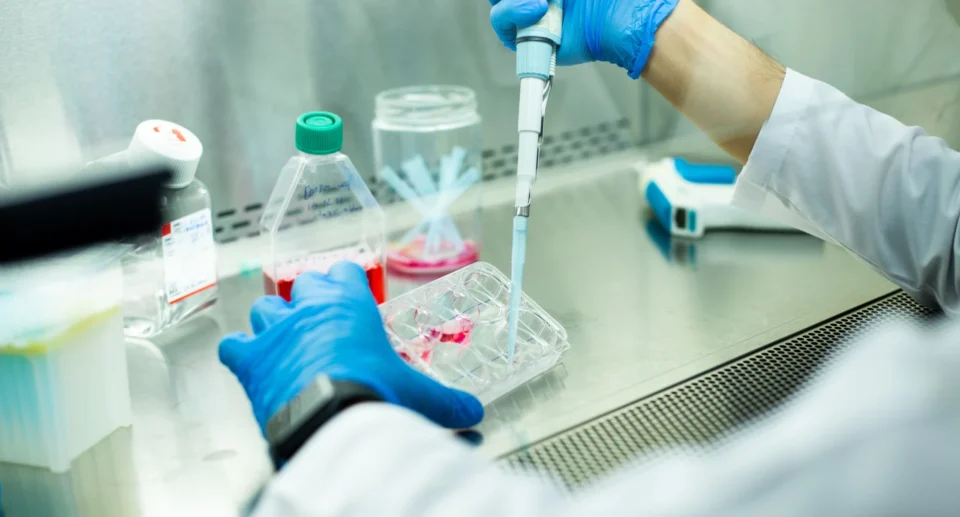Type 1 Diabetes Treatment with Artificial Pancreas: Benefits, Process & Future
Living with Type 1 Diabetes (T1D) is challenging. It involves monitoring blood sugar levels closely, regular insulin injections and lifestyle modification to prevent complications. But think of having a device that would control your blood sugar levels as naturally as a healthy pancreas would. That is what the Artificial Pancreas (AP) does. This groundbreaking system is redefining how diabetes is managed through Artificial Pancreas Diabetes Treatment. But can it be a cure? Let’s uncover the answer.
Understanding Type 1 Diabetes and the Rise of Artificial Pancreas Diabetes Treatment
Before understanding how an Artificial Pancreas works, it’s important to know the role of the real pancreas.
The pancreas is a small organ that plays a big role in keeping your blood sugar at healthy levels. It does this by making insulin, a hormone that helps move sugar from your blood into your body’s cells for energy.
In Type 1 Diabetes (T1D), the immune system mistakenly attacks the insulin-producing cells in the pancreas—called islet cells. Without insulin, sugar stays in the blood and builds up, which can lead to serious health problems.
People with Type 1 Diabetes need to take insulin every day to survive. But constantly managing blood sugar levels can be difficult and tiring.
To solve this, scientists developed a smart solution—the Artificial Pancreas. It helps automatically control blood sugar, making life easier and safer for people with diabetes.
What Is an Artificial Pancreas?
An Artificial Pancreas is a machine that replicates the function of the pancreas by regulating blood sugar levels on its own. It consists of three basic parts:
- Continuous Glucose Monitoring (CGM): An under-the-skin sensor monitors blood glucose in real-time.
- Insulin Pump: Supplies the right dosage of insulin when needed.
- Smart Algorithm: A sophisticated system that computes the quantity of insulin needed from the levels of glucose.
This device works exactly like a normal pancreas, with the amounts of insulin trimmed to the barest minimum.
How an Artificial Pancreas Works?
- The CGM reads glucose levels continuously.
- The system transmits the data to the intelligent algorithm, which determines the amount of insulin that must be injected.
- The insulin pump delivers the insulin automatically by way of a pump instead of injections.
- The system will turn off insulin infusion to avoid hypoglycemia (Low blood sugar level) if the blood glucose is too low.
The process delivers more consistent blood glucose levels compared to traditional ways.
Advantages of an Artificial Pancreas
- Better control of glucose: Maintains stability and prevents extreme highs and lows.
- Reduced number of insulin injections: No need to inject insulin themselves several times per day.
- Avoids complications: Avert diabetes complications such as pancreatitis and pancreatic cancer.
- Improves quality of life: Greater independence and flexibility in daily activities.
- Reduced patient and family distress: No longer needing to constantly monitor and adjust insulin doses.
Limitations and Challenges
The artificial pancreas is a great tool for managing type 1 diabetes, but it’s not a complete cure. Here are some limitations:-
- High cost: It is very expensive and isn’t yet fully accessible to everyone.
- Maintenance: Some patients would still need to be switched.
- Battery and device issues: Like with everything technical, it can break down or require servicing.
Is Artificial Pancreas Diabetes Treatment the Future of Diabetes Care?
Right now, there’s no guarantee that Artificial Pancreas technology will become widely available or more advanced in the near future. However, scientists are exploring other promising treatments for Type 1 Diabetes (T1D).
One of the exciting areas of research is stem cell and islet cell transplants. In this treatment, healthy insulin-producing islet cells are transplanted into people with T1D. These new cells could help the body start making its own insulin again, just like a normal pancreas.
While this approach is still in the early stages, it brings hope for a more permanent solution to managing Type 1 Diabetes.
What Makes the Artificial Pancreas Different from an Insulin Pump?
While both devices help manage blood sugar, the Artificial Pancreas goes a step further by using smart algorithms to automatically adjust insulin delivery based on real-time glucose levels from a sensor. Traditional insulin pumps require manual input or pre-programmed schedules. The Artificial Pancreas offers a more natural, automated way to control diabetes, reducing the burden on patients and minimizing fluctuations.
Can Artificial Pancreas Technology Be Used for Type 2 Diabetes?
The Artificial Pancreas is designed mainly for Type 1 Diabetes patients who rely on external insulin. However, some clinical trials are exploring its use in advanced cases of Type 2 Diabetes where insulin is needed. While not yet standard, this technology may eventually help Type 2 patients who struggle with unstable blood sugar, offering better control and fewer complications.
Future of Diabetes Management: How Smart Technology is Changing Lives
The landscape of diabetes care is evolving rapidly, and smart technology is at the heart of this transformation. Innovations such as the Artificial Pancreas, continuous glucose monitors (CGMs), mobile health apps, and cloud-based data tracking systems are giving people with Type 1 Diabetes more control than ever before.
These technologies help reduce the burden of daily management, offer more precise insulin delivery, and improve long-term outcomes. Patients no longer need to rely solely on manual monitoring and insulin injections.
With real-time data and smart algorithms, individuals can now enjoy greater freedom and better quality of life. As these technologies become more accessible, they hold the promise of reshaping diabetes care on a global scale.
Artificial Pancreas vs Traditional Insulin Therapy: Which Is Right for You?
Choosing between traditional insulin therapy and the Artificial Pancreas depends on various factors like lifestyle, cost, availability, and medical condition.
Traditional insulin therapy involves multiple daily injections or the use of insulin pumps, often requiring constant attention, manual dose adjustments, and finger-prick glucose checks.
On the other hand, the Artificial Pancreas automates insulin delivery using advanced sensors and algorithms, minimizing human error and improving glycemic control. While it offers better stability and reduces the risk of complications, it may not be suitable for everyone due to high costs and the need for training.
Understanding the pros and cons of both options, and consulting with a diabetes specialist, is key to finding the most suitable approach.
Overcoming Barriers to Artificial Pancreas Access: What Needs to Change?
Despite the life-changing potential of the Artificial Pancreas, access to this technology remains limited in many parts of the world. High device costs, lack of insurance coverage, limited awareness, and infrastructure challenges are significant barriers.
In developing countries, even basic diabetes care can be hard to access, making advanced options like the Artificial Pancreas even more out of reach. To address this, global efforts are needed to lower production costs, increase public-private collaborations, and integrate diabetes education into primary healthcare.
Expanding clinical trials, subsidies, and insurance programs can also help more patients benefit from this innovative solution. Breaking down these barriers is essential to make equal access to advanced diabetes care a global reality.
When to See a Doctor for Type 1 Diabetes or Artificial Pancreas Consultation
Early medical attention can make all the difference in managing Type 1 Diabetes and choosing the right treatment like the Artificial Pancreas. You should see a diabetes specialist if:
- You or your child are showing symptoms like frequent urination, extreme thirst, weight loss, or fatigue.
- You’ve been diagnosed with Type 1 Diabetes and need help planning insulin therapy or adjusting dosages.
- Your current diabetes treatment is not keeping your blood sugar levels stable.
- You’re experiencing frequent episodes of high or low blood sugar, especially at night.
- You want to explore advanced treatment options like the Artificial Pancreas or insulin pump therapy.
- You are planning pregnancy and need tighter control of your blood glucose.
- Your child with Type 1 Diabetes is growing and needs care plan adjustments.
- You’re interested in stem cell or islet cell transplant trials and want expert guidance.
- You feel overwhelmed by daily diabetes management and need professional support.
- You’re considering diabetes treatment in India and want to consult with experienced endocrinologists.
Don’t wait for complications to arise. Early guidance from a specialist can help you live healthier and reduce long-term risks.
Why Should You Choose Regimen Healthcare?
At Regimen Healthcare, we ensure world-class diabetes care by connecting patients to the latest Artificial Pancreas technology and expert treatment for Type 1 Diabetes.
- We specialise in Artificial Pancreas and advanced insulin therapies for Type 1 Diabetes.
- We connect you with India’s top-rated diabetes hospitals and experienced endocrinologists.
- Each patient receives a personalised diabetes care plan tailored to their condition.
- We offer access to the latest diabetes technologies approved for global use.
- Our team handles your medical travel, visa, and hospital appointments seamlessly.
- We provide affordable treatment options without compromising on quality or safety.
- Our care team stays in touch for continuous monitoring and support post-treatment.
- Patients from over 20+ countries trust us for their diabetes treatment in India.
- We ensure transparent communication, fast responses, and multilingual support.
- From the first consultation to your return home, we manage everything for you.
Choose Regimen Healthcare for trusted, expert-guided Artificial Pancreas treatment in India.
India as a Leading Destination for Artificial Pancreas
- Advanced Diabetes Technology
India offers cutting-edge treatments like Artificial Pancreas systems and islet cell transplants. - Top Diabetes Specialists
Highly experienced endocrinologists and diabetes experts provide expert care across major hospitals. - Affordable Treatment Costs
India provides world-class diabetes care at a fraction of the cost compared to Western countries. - Complete Diabetes Management
From pancreatitis care to blood sugar monitoring, India ensures end-to-end diabetes treatment. - Globally Accredited Hospitals
Many Indian hospitals are JCI and NABH accredited, meeting the highest international standards. - Personalized Care Plans
Patients receive customised treatment plans based on medical history and lifestyle needs. - Seamless Medical Travel Support
India’s medical tourism services offer visa help, airport pickup, and accommodation assistance. - Multilingual Patient Support
Hospitals and facilitators offer services in multiple languages, making care more accessible. - High Success Rates
India’s top diabetes centres have strong success rates in Artificial Pancreas and insulin therapy. - Fast Appointment Scheduling
Patients enjoy shorter waiting times for consultations, tests, and surgeries.
Conclusion
The Artificial Pancreas is a new technology for type 1 diabetes treatment. It’s not a cure, but it’s a huge difference in blood sugar control and life in individuals with T1D. And with more research coming out, there are only whispers of more miracles, such as islet cell transplants and improved insulin therapy. But in the meantime, the application of new and revolutionary technologies such as the Artificial Pancreas can be a life-changing difference in living with diabetes.
Don’t wait until you or your loved one are living with Type 1 Diabetes! Call Regimen Healthcare today to learn about the newest treatments, including Artificial Pancreas technology. We will walk you through the whole treatment to provide you with the best care.
Call now or make an appointment!
📞 Call/WhatsApp: +91-9310356465
📩 Email: [email protected]
🌐 Visit: www.regimenhealthcare.com
Let us help you find the best treatment at the best price—because your health deserves the best!
Frequently Asked Questions (FAQs)
1. Is Type 1 Diabetes curable?
There is no treatment for Type 1 Diabetes, but innovations such as the Artificial Pancreas and islet cell transplant are leading us toward better treatments.
2. What’s the distinction between type 1 and type 2 diabetes?
Type 1 diabetes is an autoimmune condition where the body is attacking cells that produce insulin, and type 2 diabetes is generally due to lifestyle and insulin resistance.
3. What are the advantages of continuous glucose monitoring?
Continuous Glucose Monitoring (CGM) provides real-time measurement of blood sugar, less frequent finger sticks, and improved control of diabetes.
4. How does insulin therapy help with controlling diabetes?
Insulin therapy takes the place of insulin the pancreas is no longer capable of producing, keeping blood sugar at a normal level.
5. Can prediabetes turn into type 1 diabetes?
No, prediabetes is a disease that can turn into Type 2 Diabetes but not Type 1 Diabetes.
6. How is the Artificial Pancreas different from regular insulin therapy?
It automatically adjusts insulin based on real-time glucose levels, unlike manual injections or fixed pump settings.
7. Can children use the Artificial Pancreas?
Yes, some systems are approved for children and help simplify diabetes management.
8. Are there any risks with using an Artificial Pancreas?
Minor risks include sensor errors or device issues, but overall benefits outweigh them.
9. Is the Artificial Pancreas a cure for Type 1 Diabetes?
No, it’s an advanced treatment—not a cure. Research for a cure is ongoing.
10. Can I stop managing my diabetes if I use this device?
No. You still need to manage meals, check the device, and follow care routines.








